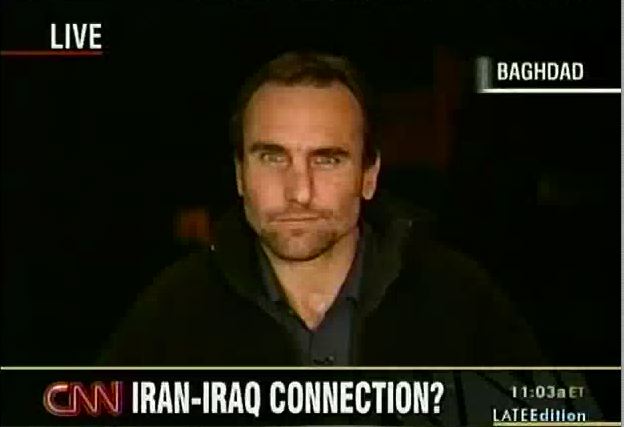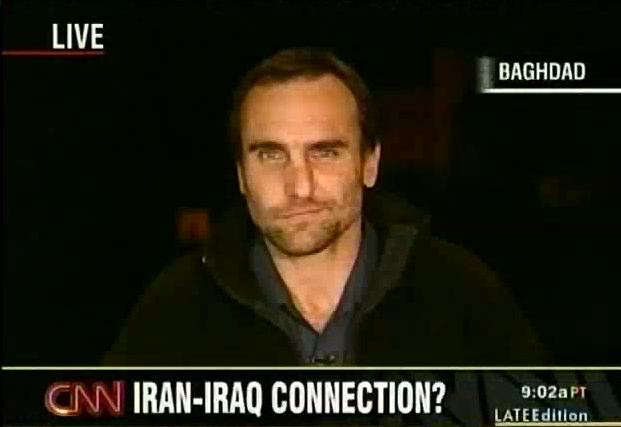LE: "Sniper rifles and mortars are not for protection."

Click photo to play
Length: 3:37
WOLF BLITZER: Another very violent day in Iraq amidst debate over whether some of the deadliest weapons are now coming in from next door. That would be in Iran. CNN's Michael Ware is joining us from Baghdad with more.
Michael, I understand there has been a briefing in Baghdad. You're getting some new information. Tell our viewers in the United States and around the world what you're learning.
MICHAEL WARE, CNN CORRESPONDENT: Well, Wolf, you're correct. There's certainly been a briefing, but how much of it is new is to be seen. In many ways, this is old information being dressed up again as new. What happened today in Baghdad is the U.S. military rolled out a senior defense official, a senior defense intelligence analyst and an explosives expert to paint a picture of Iranian military activity here in Iraq targeting U.S. troops.
Essentially they paint the picture of an Iranian campaign where the Iranians are using the very tactics that America used against the Soviet Union in Afghanistan in the 1980s, essentially using proxies to fight a war in a third country. That's what the military intelligence community is saying today.
They focused on the use of a particularly lethal-- the most lethal kind of roadside bomb here in Iraq, called an explosively formed penetrator. This is a bomb that's so devastating, it can punch through the toughest American armor on any of its battle tanks. Now, this was introduced through Shia insurgents by the Iranians, according to military intelligence. Indeed, one of the components of the bombs needs such precision machine tooling that they can only be done in Iran. They do not believe it's happened here in Iraq, but again this is an old story. These bombs first started detonating in 2004. The issue was made public in 2005. Secretary Rumsfeld himself has pointed to them.
The other thing that the experts talked about is the Iranian supply of munitions, exactly like these ones. These are the tailfins from mortars that have come from Iran. This one in particular, an 81mm, according to the military a signature of the Iranian armed forces. The fact that the tailfin is in one piece, a single-piece tailfin, another signature that it came from Iran.
But again, Wolf, we have known this. What was a little more interesting was a revelation that in recent arrests in January in Erbil by the U.S. military, the Americans now claim that they captured the operations officer, one of the key commanders of the Iranian special forces unit known as the Quds Force.
This is the high-level, very secretive organization that is running the anti-America campaign here in Iraq. The other thing that the briefers said was that this unit is being guided directly by supreme leader Ayatollah Ali Khamenei himself.
And finally, the American intelligence officers also said today that an Iraqi political faction admitted that it received weapons from Iranians that the Americans had captured, but claimed these weapons were for protection, a claim rejected by the military, who said sniper rifles and mortars are not for protection.
So that's what was laid out in this briefing today -- Wolf.
BLITZER: All right, Michael, stand by, because I want you to come back later here on "Late Edition," and we're going to continue to get some more information on these new developments coming out of Baghdad. A lot more from Michael Ware coming up on "Late Edition."

Click photo to play
Length: 3:53
WOLF BLITZER: New warnings today in Iraq that some of the deadliest weapons targeting Americans may be originating in Iran.
CNN's Michael Ware, joining us live from Baghdad with the latest. Michael, this briefing that you had today made the case that the Iranians are directly providing weapons, sophisticated munitions, to Iraqi Shia militia forces and those weapons are killing Americans. What information, what evidence did they have to back that up?
WARE: Well, Wolf, what we saw was American officials come out today and paint the picture of a program, a campaign, that Iran is using to kill American soldiers here in Iraq through Iraqi proxies or surrogates that they're arming, funding and directing.
Now, foremost amongst the weapons that are being given, says U.S. military intelligence, is the most deadly roadside bomb being used in this war. It's called an explosively formed penetrator. And essentially, it's so powerful, it can punch through the heaviest armor on an American battle tank. U.S. military intelligence says since this weapon's introduction in May 2004, at least 170 American soldiers have died. Now, that's as a result of this Iranian weapon.
They also say today, in this briefing, that the Iranian elite Quds Force unit is supplying weapons to Shia insurgent groups and political factions and among them is mortars, sniper rifles, all sorts of weapons that have been used, not just against other Iraqis, but against Americans.
Here are two mortar tail fins that U.S. military intelligence says have come from Iran. Now, here on CNN, we aired these last year. But they're precisely the same kind we saw in the briefing today. The markings, according to military intelligence, clearly trace them back to Iran, manufactured only last year. So, they've only recently come into the country. 81mm, American military intelligence says is another signature of Iran. Also, the fact that this tail fin is a single piece, intelligence says, is another signature that this came from Iran.
But the newest thing, the most interesting thing, out of this briefing is that an American senior defense official said that the Iraqi government confirmed that Iranian armed forces gave weapons to an Iraqi political faction. And these included mortars and sniper rifles, weapons that the government said, well, this political faction needs for protection. But the U.S. said these are not protective weapons; these are weapons for attacking -- Wolf.
BLITZER: Were they specific which faction received these Iranian weapons? Were they the Mahdi army, for example, loyal to the anti-American radical Shiite cleric Muqtada al-Sadr, who, as you know, his political forces are aligned with the government of Prime Minister Nuri al-Maliki?
WARE: That's right. Muqtada's forces are aligned with Maliki's government. In fact, Muqtada and his militia put Maliki in power. And these defense officials today spoke openly about the provision of weapons to Muqtada's Mahdi militia.
However, in this particular case, what they are talking about is this confirmation, by the government of Iraq, of the supply of weapons not to Muqtada's faction, but to arguably the most powerful political faction within this government. That is the SCIRI political party.
BLITZER: Michael Ware reporting for us from Baghdad. Michael, thank you. We're going to get back to you.
